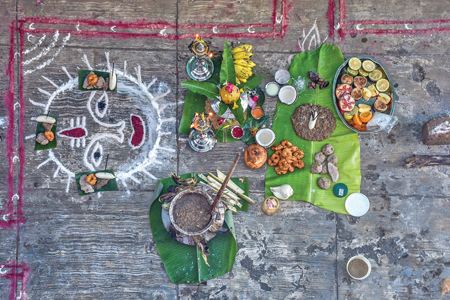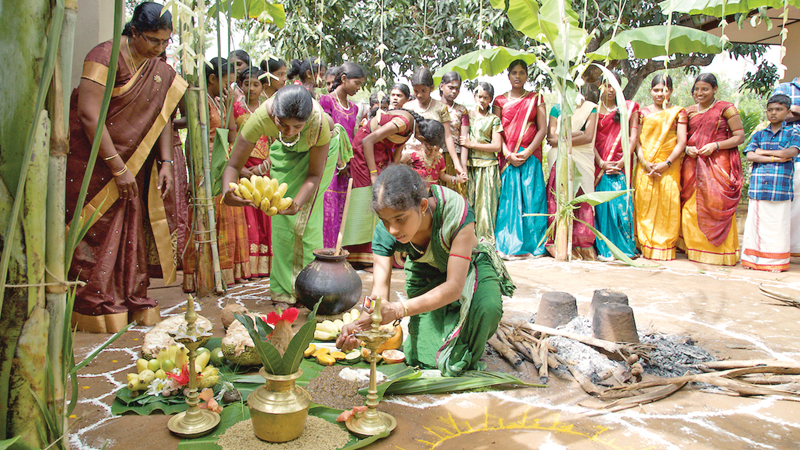The aroma of spices and freshly harvested rice that wafts through the air is intoxicating. The kolam colours bedeck every doorstep. The joyous sounds of laughter and celebration echo across the streets. This is the essence of Thai Pongal, a four-day festival that transcends mere harvest celebration.
Rooted in ancient Tamil traditions and spanning over 2,000 years, Pongal overflows with symbolism. Thai Pongal honours the sun god, Surya, expressing gratitude for its warmth and energy that supports crop growth. Meaning ‘the boiling over of the rice pot,’ Thai Pongal refers to the traditional dish made from freshly harvested rice, lentils, and other ingredients.
Communal celebration
Pongal serves as an occasion for communal celebration, acknowledging the harvest and expressing appreciation for hardworking farmers. It promotes ethnic harmony as diverse communities unite to partake in the festivities.
The festival provides an opportunity for people from various backgrounds to engage in events like cooking Pongal, participating in competitions such as kolam and Jallikattu, and cultural programs. These activities promote togetherness and unity among people, with a spotlight on the richness of diversity.
The festival traces its origins to ancient Tamil culture, celebrated for over 2000 years. Initially known as Tamizhar Thirunaal, translating to the festival of the Tamils, it served as a way for the community to express gratitude for a plentiful harvest. Over time and influenced by different cultures, Thai Pongal came to be celebrated uniquely in various regions. In Malaysia and Singapore, grand parades and cultural programs mark the occasion, while traditional rituals and temple ceremonies are predominant in Sri Lanka. Modern influences such as technology and social media have modified the celebrations while maintaining the essence of tradition.
Regional flavours
Celebrated globally by the Tamil community, Thai Pongal exhibits regional variations specific to different locations. In India, particularly in Tamil Nadu, the festival is pivotal. Celebrations typically encompass cooking Pongal, drawing Kolam, and participating in Jallikattu. Traditional foods, including various sweet and savoury Pongal dishes, are shared among family and friends.
 In countries with a Tamil diaspora, such as the USA, UK, Canada, and Australia, Thai Pongal is marked by a mix of traditional and modern events. Activities include kolam drawing competitions, Pongal cooking contests, cultural programmes, and sports events, while maintaining ties to traditional values.
In countries with a Tamil diaspora, such as the USA, UK, Canada, and Australia, Thai Pongal is marked by a mix of traditional and modern events. Activities include kolam drawing competitions, Pongal cooking contests, cultural programmes, and sports events, while maintaining ties to traditional values.
Though Thai Pongal varies across regions, the celebrations share core values and traditions. These regional adaptations highlight the diversity and adaptability of Tamil culture, blending with various influences.
The festival serves as a platform for cultural programs like traditional song performances, classical dances, and plays, often drawing inspiration from Hindu epics. These activities contribute to the celebration and preservation of traditional culture and heritage.
The festival symbolises community gratitude for a bountiful harvest and marks the beginning of a new year. Dedicated to Surya, the sun god, Thai Pongal acknowledges the sun’s role in crop growth. A significant symbol of Thai Pongal is the decorated Pongal pot, placed somewhere in the middle of homes or a community centre. The pot is ornamented with colourful patterns made from rice flour. This decoration represents abundance and prosperity when it boils over during the cooking process.
Another important custom of Thai Pongal involves creating kolam, a decorative floor design crafted with rice flour. Typically drawn in front of homes, it is believed to attract good luck and prosperity, symbolising a warm welcome to the festival. Jallikattu, another integral tradition, involves attempting to tame a bull and is deeply ingrained in the culture. This activity, often performed as a sport, symbolises the strength and courage of the participants.
The festival holds spiritual significance, serving for spiritual cleansing and purification. Many observe fasting or undertake special rituals to honour the sun god and seek blessings during this period.
Sports and games, including cricket, football, kabaddi, and tug-of-war, form part of the Thai Pongal celebrations. These events, enjoyed by people of all ages, contribute to the festive atmosphere. Preparing traditional Tamil foods like Pongal, vadai, adhirasam and other sweet treats is central to Thai Pongal. Sharing these dishes fosters a sense of community and collective enjoyment.
Community involvement is paramount during Thai Pongal, bringing people together in unity and harmony. The festival provides an opportunity for people from diverse backgrounds to celebrate the harvest and express gratitude to hardworking farmers.
Throughout Thai Pongal, communities engage in activities such as preparing traditional foods, adorning homes and streets, and participating in cultural programs, sports, games, and various events. These collective efforts enhance the sense of togetherness and community spirit, uniting people towards the common goal of celebrating the festival. In rural areas, the entire village collaborates for Jallikattu, making it a community event inclusive of people of all ages. Similarly, in urban areas, communities unite to host Kolam competitions, cultural programs, and sports events.
Thai Pongal is an opportunity for the Tamil community to celebrate their heritage, participate in traditional activities, and experience the richness and diversity of Tamil culture. Socially, the festival promotes unity and harmony, bringing people together in a spirit of togetherness and mutual respect, transcending religious or ethnic backgrounds and fostering a sense of belonging within the Tamil community.
Economically, the festival impacts the lives of the community, particularly farmers, as it serves as an occasion to express gratitude for their role in ensuring food security and prosperity. It also influences the business community, with people purchasing new clothes, jewellery, and other items during the festivities.
Modern rhythms
In adapting to modern times, Thai Pongal has embraced contemporary elements within its celebrations. Many communities now feature music and dance performances that seamlessly blend traditional Tamil music and dance with modern styles. Similarly, sports and game events include cricket and football, alongside traditional games like kabaddi.
Another contemporary adaptation involves the creation of fusion dishes, combining traditional and modern culinary techniques. This culinary evolution allows the festival to appeal to a broader audience, including those less familiar with traditional Tamil cuisine.
The younger generation has played a pivotal role in keeping the tradition alive by adapting it to the modern context. This adaptation makes the festival more accessible to a large audience, ensuring its enjoyment by people of diverse backgrounds. The new generation utilises the festival as a platform to engage in discussions and raise awareness about various social and cultural issues faced by the Tamil community.
This approach honours the festival’s roots and ensures its relevance and impact in the evolving cultural landscape.
****
Fusion of Tradition and Modernity
Traditional Celebrations
– Thai Pongal is an ancient festival with roots tracing over 2,000 years in ancient Tamil culture.
– Celebrated globally by the Tamil community, the festival is especially pivotal in Tamil Nadu, India.
– The festival, initially known as Tamizhar Thirunaal, revolves around expressing gratitude for a bountiful harvest.
Regional Variations
– Celebrations in different regions showcase the diversity and adaptability of Tamil culture.
– In Malaysia and Singapore, grand parades and cultural programs mark the occasion, while Sri Lanka emphasises traditional rituals and ceremonies.
– The Tamil diaspora in countries like the USA, UK, Canada, and Australia blends traditional and modern events during Thai Pongal.
Contemporary Elements
– Modern influences are evident in contemporary music and dance performances blending with traditional Tamil styles with modern trends.
– Sports events showcase a mix of traditional games like kabaddi with modern sports such as cricket and football.
– Fusion dishes combining traditional and modern culinary techniques broaden the festival’s appeal.
Youthful Adaptations
– The younger generation plays a crucial role in adapting Thai Pongal to the modern context.
– This adaptation ensures the festival’s accessibility to a wider audience, making it enjoyable for people of diverse backgrounds.
– The festival serves as a platform for the younger generation to engage in discussions and raise awareness about various social and cultural issues faced by the Tamil community.
Cultural Preservation
– Thai Pongal provides a platform for cultural programs, including traditional song performances, classical dances, and plays inspired by Hindu epics.
– The festival symbolises community gratitude for a bountiful harvest and serves as a time for spiritual cleansing and purification.
– Community involvement and togetherness remain paramount, fostering unity and harmony among people from different backgrounds.
Economic Impact
– The festival influences the lives of the community economically, especially farmers, who are honoured for their role in ensuring food security and prosperity.
– Businesses experience increased activities during the festival, with people purchasing new clothes, jewellery, and other items.
Modern Adaptations
– Social media and technology play a role in promoting Thai Pongal globally and connecting Tamils around the world.
– Online competitions, including kolam drawing and Pongal cooking contests, are becoming popular, showcasing the festival’s modernisation.
Timely Relevance
– Thai Pongal continues to adapt to changing times while preserving its traditional roots, ensuring ongoing relevance and impact.
– The festival remains a symbol of unity, cultural pride, and gratitude, transcending geographical boundaries and generations.









